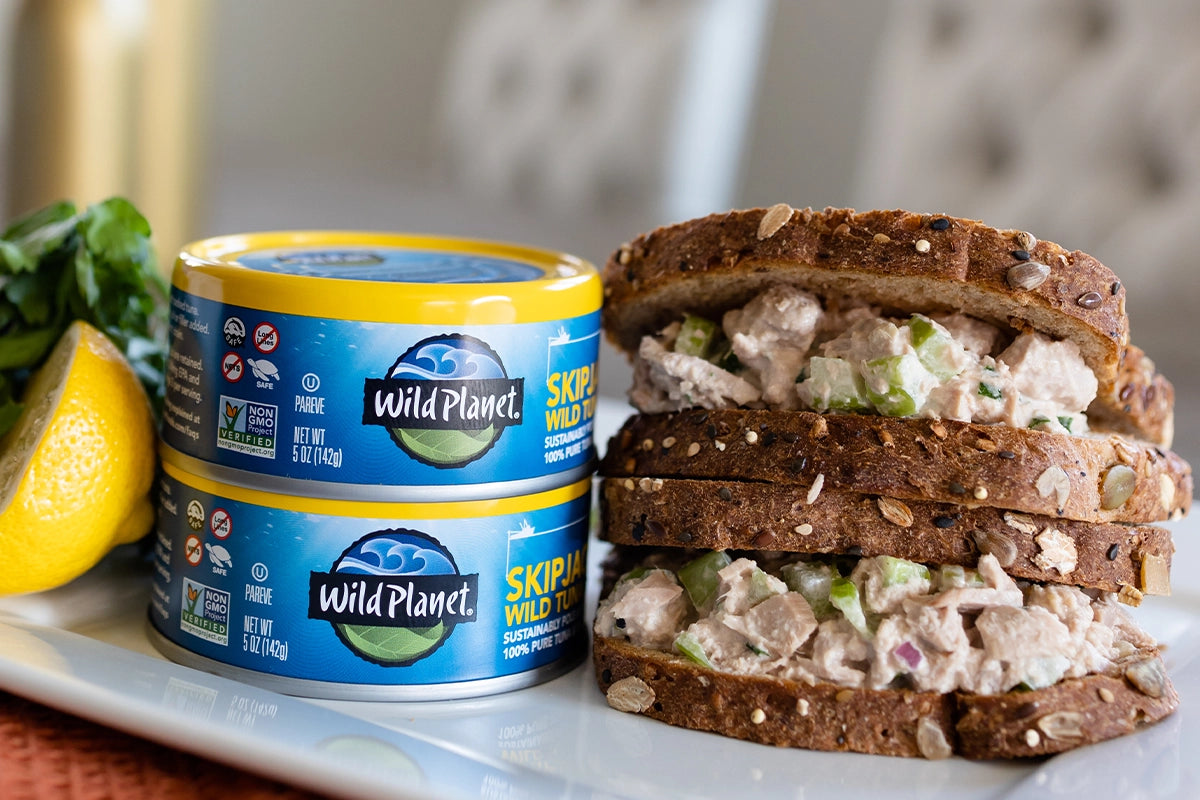Learn about the health benefits of eating fish and seafood, how canned seafood compares to fresh, and the importance of sustainably caught fish.

Did you know that fish is among the healthiest foods you can eat? Besides being a delightful palate-pleaser, fish boasts a wealth of essential nutrients, including Omega-3 fatty acids, renowned for their heart health benefits to help avoid cardiovascular disease.
These important fatty acids help lower blood pressure and play an instrumental role in brain function. So, next time you're pondering what to pick for dinner, remember that a delicious recipe with seafood as its star may just be the brain-boosting meal you need!
The FDA’s Dietary Guidelines for Americans recommend that adults eat at least 8oz of seafood per week while children have 2 to 8oz per week, based on their age range, to capitalize on their health benefits [1].
The American College of Obstetricians and Gynecologists recommends 8 to 12oz of fish lower in mercury for pregnant or breastfeeding women. This includes skipjack tuna (also known as “light tuna”), anchovies, salmon and sardines [2].
Specific Health Benefits of Fish
While many of us have heard that seafood is a healthy choice, we might not know exactly why.
Fish is a nutrient-rich superfood loaded with lean protein, vitamins, minerals, and essential fats that our body requires for optimal functioning. Beyond the physical health benefits of a fish-rich diet, fish consumption may also support mental health, with research suggesting a potential role for Omega-3s in reducing the risk of depression and anxiety.
Here are some key points to consider if you are thinking about adding more fish into your diet:
- Protein is important to bones, muscles, cartilage, and skin. It is used to repair and build tissue, make important enzymes, regulate hormones, and more [3]. Notably, fish is a great source of high-quality protein, often providing around 20 grams of protein per 3-ounce serving. Including fish in your diet can help you meet your protein needs in a nutrient-dense way.
- EPA and DHA Omega-3 fatty acids, especially important for brain and eye development, are found in fish, shellfish, and marine algae. Omega-3s are a component of the membranes surrounding every cell in our bodies. They help provide energy and support functions in our hearts, blood vessels, lungs, immune systems, and endocrine systems [4]. Numerous controlled trials also reveal that these fatty acids may fight depression and increase the effectiveness of antidepressant medications.
- Fish is a great source of important vitamins and minerals our bodies do not produce on their own [5]. This includes phosphorus, vitamin B12, iron, selenium, zinc, magnesium, potassium, calcium, and vitamin D. All of these are substances our bodies need to develop and function our brain and nervous system normally. Fish are among the best dietary sources of vitamin D, which plays a crucial role in fighting fatigue, moodiness and boosting our immune system. When we are low in vitamin D we can feel down or “off.” This is why the “winter blues” can be linked to the limited vitamin D we receive from the sun during these shorter days. Adding fish, which is rich in vitamin D, to our diet helps give us the nutritional boost we need to get through the darker days of winter.
- Fish provides a leaner source of protein for our heart health than red meats. Fish is low in harmful fats and high in beneficial Omega-3 fatty acids, According to the American Heart Association, protein plays a vital role in muscle growth, repair, and maintenance. It also aids in producing enzymes and hormones, balancing body fluids, and transporting oxygen through blood. This makes fish an ideal element of a healthy diet for maintaining heart health and reducing the risk of cardiovascular disease.
- Studies also show that people who eat fish every week have more gray matter (the brain’s major functional tissue) in the parts of the brain that regulate emotion and memory. Fish is also a source of phosphatidylserine, a phospholipid fatty substance that covers and protects the cells in the brain [6].

Canned Fish Compared to Fresh Fish
Canned fish is as healthy as fresh fish if those tinned seafood products are 100% pure and free from “extras” like emulsifiers, preservatives, and other additives. Canned options have as many, and sometimes more, EPA and DHA Omega-3s as fresh fish [7], and are also a more affordable and convenient choice thanks to a longer shelf life.
While many consider canned tuna and salmon when thinking of canned fish, did you know you can also enjoy canned sardines, anchovies, mackerel, and other fish lower on the food chain, which happen to be especially rich in EPA and DHA Omega-3 fatty acids?
Adding smaller, more plentiful fish species like these into your diet is an easy and delicious way to receive all the nutritional benefits they offer while also supporting the biodiversity our oceans need to remain healthy.

The Importance of Sustainably Caught Canned Fish
Sustainable seafood is “harvested in an environmentally safe manner with the least impact on the ocean ecosystems and surrounding wildlife.” [8] If you want to know whether the canned fish you buy is sustainably caught, you can look at the information on the label.
For example, if you are interested in tuna, look for language that states it is 100% pole & line caught like that found on our Wild Planet tuna cans.
With this method of fishing, no nets are used. Fishermen use bait to attract schools of tuna and use a pole & line to catch younger, migratory tuna one by one. Sustainable fishing practices are important because they protect our oceans by helping to keep all types of marine life abundant now and for future generations.
Large-scale, industrial fishing practices used by many commercial tuna brands use wasteful fishing methods, including nets, FADs (fish aggregating devices), and long lines. This leads to bycatch of non-targeted species, including endangered sea turtles, sharks, and other fish, being caught and left to die. When you see a label stating 100% pole & line caught, you can also feel confident that the mercury levels in the tuna are lower.
Wild Planet’s canned tuna has mercury levels 6-14 times lower than the FDA threshold because the fishermen we partner with catch smaller fish. These fish have accumulated lower levels of mercury than older, larger tuna.

Enjoy Fish All Year Long
Sustainably caught canned seafood can be enjoyed year-round as part of a delicious, nutritious, and convenient snack, lunch, dinner, and even breakfast.
Here are some of our favorite canned fish recipes if you need inspiration.
Sardines and Greens Pasta
Sardines, and Greens Pasta is a wonderfully savory dish that ingeniously combines sardines' smoky flavor with milder anchovies' rich, umami flavor and then pairs them both with the aromatic presence of dill and garlic.
It is not just a delight for your taste buds, but also an easy and quick-to-prepare meal that packs a nutritional punch.

Classic Tuna Salad Sandwich
The Classic Tuna Salad Sandwich is a timeless favorite, renowned for its perfect blend of freshness and tang.
Crafted with the crispiness of celery, the sweet undertones of onion, the zest of lemon, and the distinct flavor of relish, this sandwich is made even more wholesome with the addition of 100% pole & line caught Wild Planet albacore tuna, ensuring an explosion of flavors with every bite.

Anchovy Fried Rice
Anchovy Fried Rice is a delightful and hearty dish that combines our milder anchovies' rich, umami flavor with the aromatic blend of garlic and bell peppers.
The entire dish is then stir-fried with brown rice, creating a wonderful balance of textures and flavors, and finished with a sweet and savory sauce that makes this dish truly delicious.

Spicy Mackerel Fish Tacos
Spicy Mackerel Fish Tacos are a tantalizing dish that reimagines the traditional taco with a unique blend of flavors, textures, and nutrients.
Our rich mackerel fillets form the centerpiece, draped in a zesty spice blend nestled within a warm tortilla with a medley of fresh, crunchy cabbage, a dash of tangy salsa, and finished off with a lively squeeze of lime for an unforgettable taste experience.

Wild Salmon Sushi Bowl
The Wild Salmon Sushi Bowl offers a fusion of flavors, combining the richness of wild salmon with the zing of ginger and the buttery smoothness of avocado.
Each bite takes you on a culinary journey, bringing together the distinctive taste of sushi in a convenient and healthful bowl, providing a unique dining experience that's satisfying and abundant in Omega-3 fatty acids.

Each of these recipes serves as a testament to the diversity and adaptability of canned fish.
By making mindful choices and selecting seafood that is sustainably caught, we can enjoy the many health benefits of fish while protecting our oceans and preserving our one wild planet.

Preserving Oceans, Promoting Health
Embracing sustainably sourced canned fish isn't just a culinary choice; it's a commitment to safeguarding our marine ecosystems while ensuring optimum health.
By eating fish regularly and opting for seafood harvested through environmentally friendly methods, we contribute to the longevity of the ocean's biodiversity and enjoy the nutritional benefits these fish offer, including Omega-3 fatty acids, vitamin D, and a boost to heart and brain health.
Choosing brands that prioritize sustainable fishing practices, like Wild Planet, is a practical way to enjoy a variety of seafood responsibly.
From heart-healthy sardines to low-mercury tuna, these products offer a tasty and convenient way to incorporate seafood into your meals year-round.
Let's continue to make selective and intentional choices, relishing our oceans' incredible bounty while ensuring their protection and preservation for generations to come.
Sources:
- https://www.fda.gov/food/consumers/advice-about-eating-fish
- https://www.acog.org/clinical/clinical-guidance/practice-advisory/articles/2017/01/update-on-seafood-consumption-during-pregnancy
- https://www.piedmont.org/living-better/why-is-protein-important-in-your-diet
- https://ods.od.nih.gov/factsheets/Omega3FattyAcids-Consumer/
- https://www.hsph.harvard.edu/nutritionsource/vitamins/
- https://www.oxygenmag.com/nutrition-for-women/9-reasons-canned-fish-is-an-underrated-fit-food/
- https://www.health.harvard.edu/newsletter_article/ask_the_doctor_is_canned_fish_good_for_the_heart
- https://www.themanual.com/food-and-drink/sustainable-seafood-shopping-guide/








